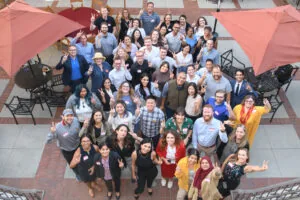Description
In 2016, the Facebook-Cambridge Analytica data scandal shook the political landscape. Since then, an increasingly sophisticated way of leveraging technology in politics has been the center of concern for political pandits. As the prevalence of technology grows, so does the number of questions about its use and value, and its impact on politics and civil society.
In this seminar, USC Center for the Political Future (CPF) Co-Directors Bob Shrum and Mike Murphy discuss how current technologies are being used in politics. What are the benefits of those technologies? Has technology helped in democratizing the elections, or has it divided Americans? How can users know if these technologies adequately protect our privacy and security? In turn, how do privacy laws affect these technologies?
The panel features Morteza Dehghani, associate professor of psychology at USC Dornsife College of Letters, Arts and Sciences; Katie Harbath, founder and CEO of Anchor Change; Cheryl Hori, founder and chief strategist at Pacific Campaign House; and John Patzakis, executive chair and chief legal officer at X1.
Who Will Benefit
– Social media strategists seeking to understand the impact of social media on current politics
– Young voters hoping to understand if social media platforms affect their political opinions
– Policy makers wanting to know how social media played a role in the 2020 election
About Our Featured Faculty
Morteza Dehghani is an associate professor of psychology and computer science at USC as well as the university’s Brain and Creativity Institute (BCI) and Computational Social Sciences Laboratory (CSSL). His research spans the boundary between psychology and artificial intelligence. His work investigates properties of cognition by using documents of the social discourse, including narratives, social media, transcriptions of speeches and news articles, in conjunction to behavioral studies. His research interests include: human values, theory constrained natural language processing and neuro-semantic representations. Professor Dehghani co-authored the book The Atlas of Language Analysis in Psychology and wrote chapters in…. Machine Ethics. Dehghani completed his PhD and MS from Northwestern University and MS and BS from University of California at Los Angeles.
Mike Murphy is the co-director of the Center for the Political Future at USC. Murphy is one of the Republican Party’s most successful political media consultants, having handled strategy and advertising for more than 26 successful gubernatorial and senatorial campaigns. His record in helping Republicans win Democratic states is unmatched by any other GOP consultant. Murphy has been called a “media master” by Fortune magazine, the GOP’s “hottest media consultant” by Newsweek, and the leader of a “new breed” of campaign consultants by Congressional Quarterly. He is a widely known political pundit, appearing frequently on NBC, CNN and NPR. Previously, he served as a regular on the Meet the Press political roundtable and wrote the “Murphy’s Law” column for TIME Magazine.
Robert “Bob” Shrum is the director of the Center for the Political Future and the Carmen H. and Louis Warschaw Chair in Practical Politics at USC Dornsife. A legendary political strategist, he was described as “the most sought-after consultant in the Democratic Party,” by The Atlantic Monthly. He was the strategist in over 25 winning U.S. Senate campaigns, eight successful campaigns for governor, successful campaigns for mayors in major American cities, and numerous campaigns for Congress and other statewide offices. His numerous clients included Edward Kennedy, Joe Biden, John Glenn, and Barbara Mikulski, David Dinkins and Tom Bradley — and John Kerry and Al Gore in their presidential races. Overseas his clients included Israeli Prime Minister Ehud Barak, the British Labour Party, the Prime Minister of Ireland, and the Presidents of Colombia and Bolivia.



